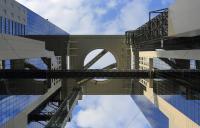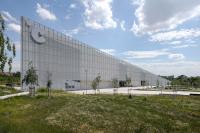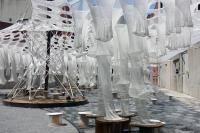Interstice I+II
New Delhi, 印度
Interstice is an endeavor to explore interstitial spaces and bring in a new way of living, one that is without borders. Since modern tenements lay undue stress on privacy and closed living, Interstice creates a space that upholds communal environ without comprising on personal spaces. The residential spaces are ensconced in a structural exo-skeleton zigzag between the two introverted vegetal facades irrigated by harvested rainwater. Because of its meandering structure, an internal area and lot of interstitial spaces are created. Each flat is made to look distinct from the other and the only common factor in each is the asymmetrical dimensions and openness. Since the interiors are full of sharp turns and interesting angles, it would be quite a task to arrange furniture and accessories in the room, truly a tribute to post-modernism.
Incongruent parts of these urban abodes project out of private spaces thereby creating ‘interstitial community volumes’, between house and façade. The vegetal walls are a community resource that intrinsically links, even visually divorced, spaces of the apartment block.
The Response
Today our cities have become matrices of boundaries, enclaves and territories. Ownership of a space is asserted by internalising its entire volume, by building edge to edge. This unfortunate trend has led to an alienation that drives us further into insular and introverted lifestyles. We try to fortify ourselves against other inhabitants of the city and the elements. In order to sustain this almost paranoid desire for extreme privacy and internal environment control, we try to stake exclusive individual ownership on the precious but meagre resources of the city. We have forgotten the our traditional city life of community spaces (mohallas) and shared resources (baolis). This stack of independent residences wishes to address two deficiencies of the modern urban row house: detachment from nature and disconnect from community.
Significant Features
The most arresting aspect of Interstice is the projections, which are designed to integrate the concepts of a private abode with community living. The glass boxes that jut out of the residences are a cross between old-fashioned balconies and French windows. From these nooks one can view the inner lawn, the vegetal walls as well as the other residences., thereby contributing to greater visibility and emotional connect between inhabitants, as opposed to the block system residences, which ‘block’ the vision and level of interaction among people.
The structure has a basement too, which holds the swimming pool. Stress is laid on creation of communal places like the pool and the lawn where the inhabitants can meet up.
The Green facades are an interesting creation that holistically combines the whole project. Irrigated by harvested rainwater, these introverted green walls provide a visual and thematic connect for every residence. Since these facades are omnipresent, they interlink even visually divorced places.
The overall look of the building is definitely modern. The sharp angles, straight lines, geometric patterns and unorthodox structure highlight the nouveau attitude of modern architecture. Yet the underlying theme is traditional, earth-bound and practical. All these aspects are inter-woven within the precincts of eco-friendly living. With their design for interstice, the architects have tried to interpret the term urban in an entirely different way.












